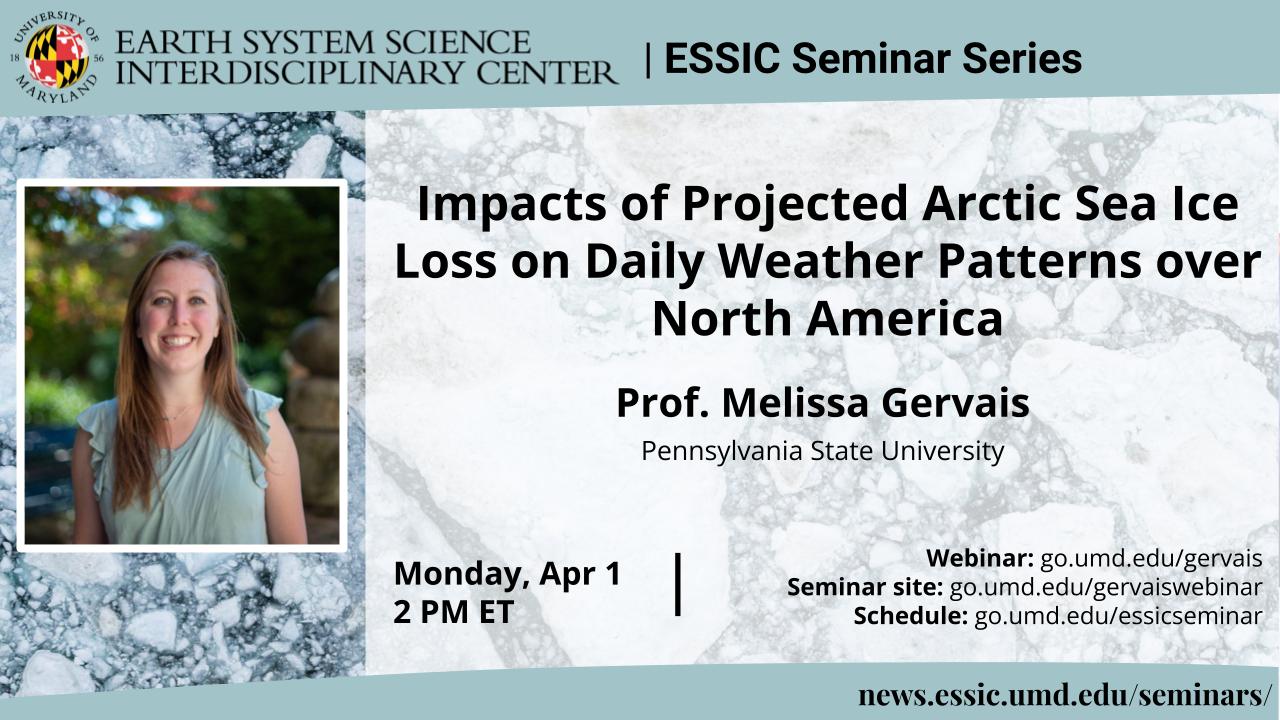
Impacts of Projected Arctic Sea Ice Loss on Daily Weather Patterns over North America
Prof. Melissa Gervais
Pennsylvania State University
Monday April 1, 2024, 2 PM ET
Abstract:
Arctic sea ice plays a critical role in the climate system, acting to reflect incoming solar radiation and limit heat and moisture flux from the ocean to the atmosphere. Its loss can have profound impacts on the atmosphere, most notably in the form of Arctic Amplification (AA) where the Arctic warms more than the mid-latitudes. The potential for sea ice loss to impact atmospheric variability and extreme events has been the subject of great debate. Several studies have shown that future Arctic sea ice loss can lead to a decrease in temperature variance over North America as well as a reduction in the intensity of extremes such as cold air outbreaks (CAOs). However, the statistical metrics typically used to identify these changes are limited in their ability to probe more deeply into the mechanisms responsible. In this study, we analyze results from two fully coupled Community Earth System Model (CESM) Whole Atmosphere Community Climate Model (WACCM4) simulations with sea ice nudged to either the ensemble mean of WACCM historical runs averaged over the 1980–99 period for the control (CTL) or projected RCP8.5 values over the 2080–99 period for the experiment (EXP). Dominant large-scale meteorological patterns (LSMPs) are then identified using self-organizing maps applied to winter daily 500-hPa geopotential height anomalies (Z’500) over North America. We investigate how sea ice loss impacts the frequency of these LSMPs and, through composite analysis, the sensible weather associated with them. With this LSMP framework we provide new mechanistic insights, demonstrating a role for thermodynamic, dynamic, and diabatic processes in sea ice impacts on atmospheric variability. Understanding these processes from a synoptic perspective is critical as some LSMPs play an outsized role in producing the mean response to Arctic sea ice loss.
Biosketch:
Melissa Gervais is an Assistant Professor in the Department of Meteorology and Atmospheric Science and a Co-Hire of the Institute for Computational and Data Sciences at Penn State. The central motivation for her work lies in understanding how climate change is manifested as changes in daily sensible weather that impact society. Her research group studies a wide range of topics in climate dynamics often involving coupled interactions between the atmosphere, ocean, and sea ice, using tools such as climate model simulations and machine learning. Dr. Gervais received her B.S. and M.S. from the University of Toronto and her Ph.D. from McGill University. She was also the recipient of an NSF CAREER award in 2023 focused on understanding the impacts of future sea ice loss on large-scale patterns of variability and cold air outbreaks.
Webinar:
Event site: https://go.umd.edu/gervais
Zoom Webinar: https://go.umd.edu/gervaiswebinar
Zoom Meeting ID: 969 3474 5000
Zoom password: essic
US Toll: +13017158592
Global call-in numbers: https://umd.zoom.us/u/aMElEpvNu
For IT assistance:
Cazzy Medley: cazzy@umd.edu
Resources:
Seminar schedule & archive: https://go.umd.edu/essicseminar
Seminar Google calendar: https://go.umd.edu/essicseminarcalendar
Seminar recordings on Youtube: https://www.youtube.com/user/ESSICUMD


